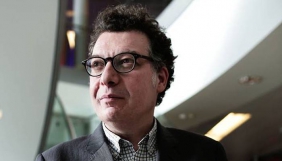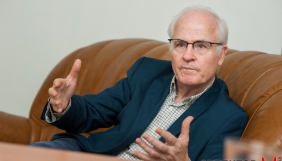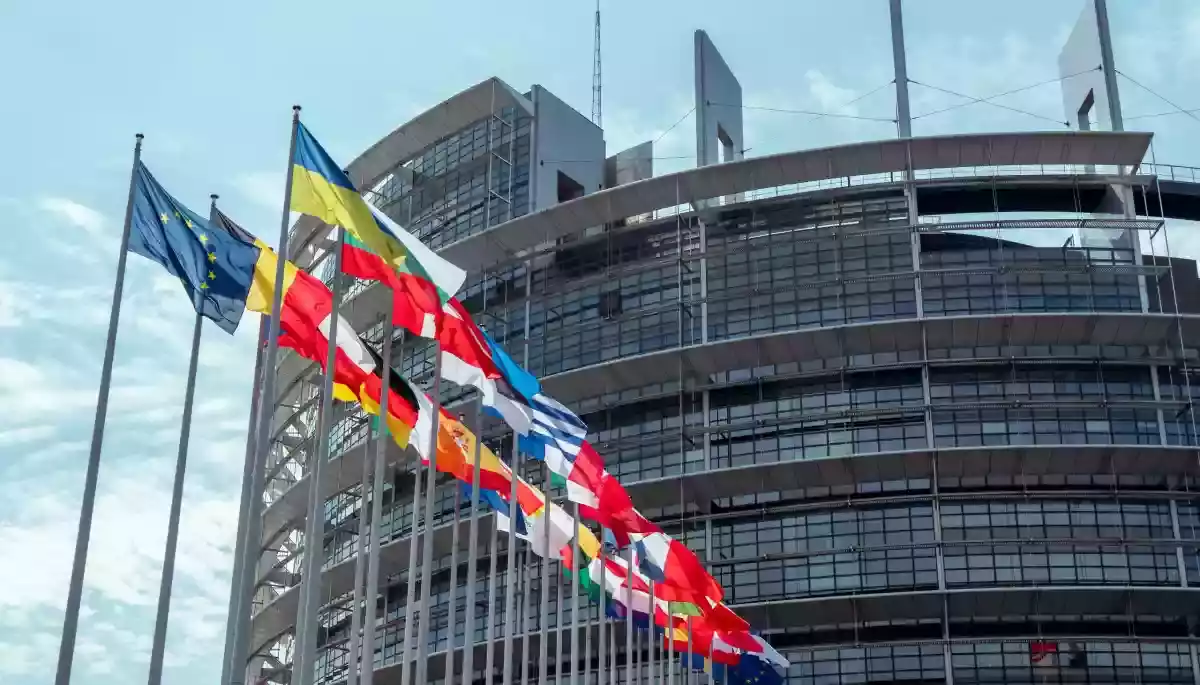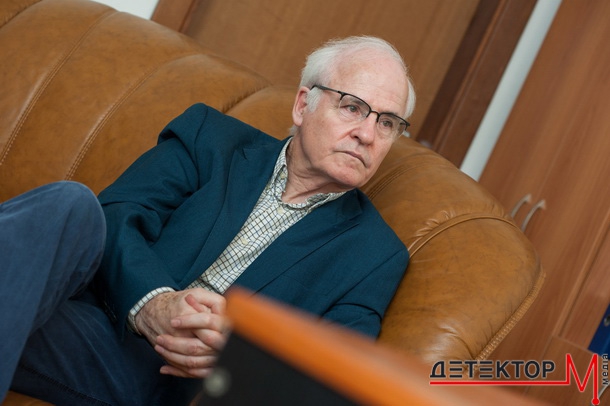
Aidan White: By registering on Facebook, we seem to say: "Take my life and exploit it!"
Aidan White: By registering on Facebook, we seem to say: "Take my life and exploit it!"
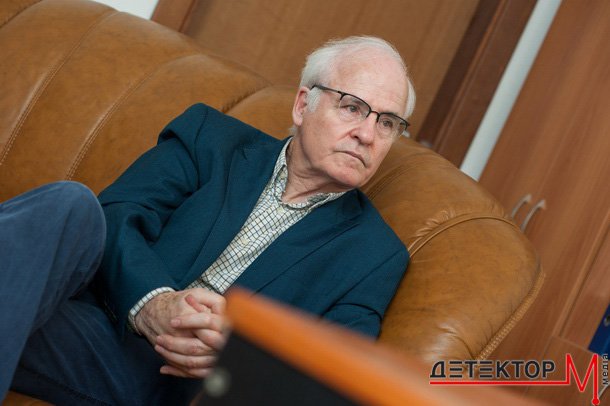

In Ukrainian.
"We have to admit that we have created an ugly culture of communications in which we have lost our private lives" says White. "And we have created bubbles - we live in them and have friends and prejudices that help us not hear voices which we do not like. And if we come across what we do not like, then we say that this is a lie."
Aidan White is extremely critical about the activities of major technology companies such as Facebook or Google. He believes that they should be more socially responsible because their algorithms help to spread hate speech or propaganda and, in fact, they place the high-quality journalism and disinformation on the same level.
However, journalism, in his opinion, suffers also from the fact that many journalists, first of all, have forgotten about professional standards, and secondly, do not support each other. The lack of solidarity in the media community is what Mr. White observes around the world.
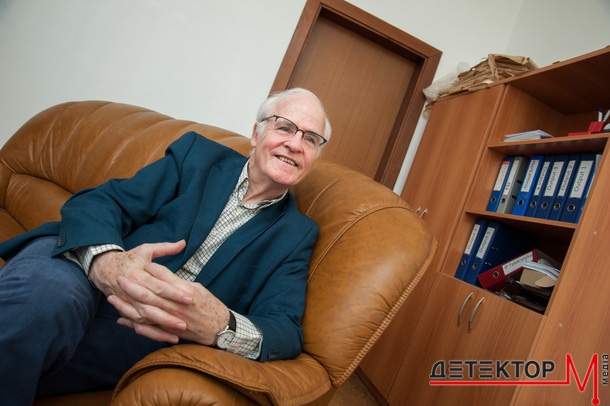
Aidan White was the General Secretary of the International Federation of Journalists (IFJ). After 24 years of work there, in 2011, he left the federation. Before the work at IFJ, White worked for 19 years as a journalist (from 1980 to 1987 at The Guardian).
Now he is the Director of the international union of media employees Ethical Journalism Network , a global organisation promoting good governance principles and new accountability standards at all types of media.
Aidan White initiated and managed project funded by donors in Africa, Latin America, Europe and Asia. These projects covered a wide range of issues: professional skills of journalists, safety of media employees, ethical principles of journalism, anti-racism measures, peacekeeping activities, humanitarian aid and development of media.
Mr. White is the author of articles, reports and books on journalism and human rights, in particular, The Digital Labor Challenge: Work In the Age of New Media (2012) and The Future of Journalism (2010).
Aidan White visited Kyiv in June at the invitation of the Organization for Security and Cooperation in Europe (OSCE), the purpose of his trip was to provide advisory services concerning strategic development for the Journalistic Ethics Commission. In an interview with MediaSapiens, Mr. White told how the Commission itself can help in establishment of standards, why does it have close relationship with media literacy, and which steps, he believes, should be made by large technology companies in order not to spread propaganda and hate speech.
"Politicians will never say: "We will leave the media alone"
You have been working in journalism for many years. Are journalists now less compliant with the standards than ever before, according to your observations?
I think, there’s a global crisis for journalism, and a global crisis for information standards. You know, we live in a world where there is more propaganda, more political spin, more public relations, more hate speech, more intolerance communications. And that could be put down to two things. One is the growth of unregulated, uncontrolled communications thanks to the internet. But also it can be put down to the weakening policy of media.
We see media run around the world under pressure. And as a result of that is a massive crisis for journalistic standards. So there are less journalists being employed, there is less money spent on training, less money given to journalists to do research so they can get their stories right. And there is much more political and corporate pressure than there ever has been. And it’s not just a crisis for journalism. It’s a crisis for democracy. It’s a crisis for the peace…. If you look around the world today, you’ll find information wars taking place in almost every single corner of the world. There is an information war still taking place in the Balkans. There is an information war between India and Pakistan, in the Middle East, in the Ukraine and Russia, and around all of the former Soviet Union countries. There is an information war between China and Hong Kong, and China and Japan, and China and Korea. There is an information war taking place in the Central Africa, and so on.
There’s a question that we have to address is how do we create a culture of communication than information in a completely new world of information that is respectful of morals and standards? And what we’re interested in is how we can strengthen journalism and journalism be part of finding a solution to the global information crisis.

You said about political pressure on journalists – does it occur anyhow different now?
No, it’s good old fashioned same way. It’s authoritarian politics trying to control information. It’s President Putin investing in propaganda. It’s President Trump attacking the media, head on and accusing them on fake news at every opportunity and creating disputes. It’s politicians interfering in election process to use unregulated ways of communicating and targeting voters. The political pressure is enormous. A journalist who tries to be independent and tries to tell the truth honestly and with quality is accused of being a traitor, of not being patriotic, accused of basically playing into the hands of propagandist on the other side. And it’s a crisis not just outside… in the globe itself. It’s a crisis in Europe.
So it’s no surprise to come here, into Ukraine, to find actually that media are a part of a struggle, are engaged in a struggle just to be independent..
Politicians are not saying: oh, we’ll leave the media alone. No-no, they never say that. They say: we want the media to be our voice-box. And if the media are not our voice-box then the media are the enemy. And they’d say when the leader of so called ‘free world’ accuses independent journalism of being the enemy then I think we can rightly say we have a problem for democracy.
Is the situation in the UK not much better?
The situation in the UK is much like the situation in other parts of Europe. Media struggle to be truly independent. There’s heavy political influence. In the last election, for example, we saw that three quarters of the mainstream press in Britain were hard supporters of a conservative right-wind agenda. They were completely out of touch. Because of the election showed that people didn’t listen to them, didn’t follow them and so on. But it shows how dangerous it is when media are so out of touch that they completely miss the messages being sent by ordinary people. So ordinary people, the audience, don’t feel the media speak for them. So when you have the Daily Mail, the Daily Telegraph, the Times, the Sunday Times, the Daily Express – all of these media saying with one voice support this, and the people saying no-no-no.
“Owners see media as their trophy possessions”
How much do you think media owners influence the compliance with standards?
We have two problems. We have one problem which is the capacity of journalists to be ethical. But the second problem we have is that the ownership of the media is out of control. It’s not in touch with democratic standards. So owners feel that their own media not as institutioned to promote good democracy and democratic exchange. They own media as trophy possessions. These are the possessions that they can use to further their own corporate interests or their own political interests. And we see this everywhere. So if you want to succeed in politics in the Western Balkans or in this country or another country, the best thing you can do is to invest in a radio station. Or buy a TV or buy a newspaper. Why? Because you want to make money? No! Because you can use this as an instrument to further your political or corporate interests. When you have this lack of respect within the ownership community of media for the democratic responsibility of media to provide quality information to society as a whole then you have a major problem.
A major crisis of ownership with a lack of respect for moral standards in the democracy. There is no regulation to avoid conflicts of interest. And the worst in whole is there is a lack of transparency. We don’t know who owns these media, where they get their money from, how they operate.

What are the most effective tools for ensuring the independence of media from the owners, in your opinion?
It’s limited what journalists can do. But there are things that the journalists can do. The first thing journalists can do is that they can work together. They can support one another. If a journalist is attacked. Even if they are working for an oppositional… a different media organization, they should be supportive. There should be more solidarity between journalists.
Secondly, journalists and media should support ethics. The work that they do. And they can do this first of all by demonstrating their support for things like the commission on media ethics. It seems to me that the commission on media ethics in the Ukraine has been allowed to become more abundant. People don’t recognize it. People say it doesn’t do anything. It’s not effective. Or one of the reasons it’s not effective is because it’s not being supported adequately by journalists and media organizations who should know better. So I would hope that one of the first things that going to happen in the coming period is to reinvigorate the commission for journalists ethics as a focal point for struggle, for the defense of standards in the Ukrainian media.
Now, that’s what I’m saying they would not solve their problem on their own. They need political support from people who genuinely want to build democracy. New movement inside Ukraine’s society which recognizes that reliable trustworthy information is the absolutely essential ingredient in building a democracy. If you, society, is only driven by propaganda, bias, fake news, malicious untruth, you’re never going to have a democracy. It’s not going to function. It’s clear. So you need to protect people’s right to speak, to express different opinions.The problem is… is it in Ukraine, like in the rest of the world, who are seeing the new information order created by the companies like Google, FB, and Twitter etc., who are not encouraging pluralism. In fact, they are working against pluralism. They do not respect the journalism and the work the journalists do as having special importance in our society. For them, information from media is just the same as information from advertisements and advertisings information, information from propagandists, information from terrorists, information from extremist groups, information from pornographers. Only thing that matters in this business model is whether or not that popular, people click on them. Because it’s popularity that generates money.
Regarding the fact that journalists have to defend the standards. In general, the idea of accountability of journalists to the society suggests that this is a certain mission, and not just a job. I think that not all people who start this profession understand it. Is it possible to educate/teach these ideas within the schools of journalism, or in any other way?
How do we educate journalists? That is one of the prime works that we do. I go around the world talking to journalists and media: remember the core principles of our profession. I was last doing in South Africa. I addressed journalists coming from 30 or 40 countries around Africa, around the world. My messages to them were: Why are you a journalist? What are the ethics of journalism? Why do you need to support ethics at this period? For them, it was interesting. And it is like the same. I go to these meetings everywhere. Journalists say ‘Oh, really? I forgot all about that. Why? This is amazing.’ And, of course, one of the things I find is that we have to go back to the beginning and fight for the principles that journalism started with. Because they’ve forgotten about the importance of accuracy, of fact-based communication. They’ve forgotten about transparency, that they need to say who they are, what they do until make apologies when they make mistakes.
And when I talk to journalists, they say: absolutely, we really want to do it. But the question they ask me - it’s all very well for you to talk about your five principles but tell me how I’d put that into practice in my work when I have a politician who’s threatening me? So we have to recognize two things from this. One: journalists want to do with this job. Journalists are not there sitting “oh, I’m a corrupt person I want to be corrupt. ” Journalists do not want to be forced to work in conditions that make it unethical to do their work. And secondly, we have to do more to protect them from threats for journalism.

But also, one of the reasons why despite of all of these problems I’m very optimistic is because I spend a lot of time talking to journalism students. I talk to journalism students in America, in the Balkans, in Africa, in Europe and so on. Whenever I see a group of two or three hundreds of young journalists, who want to do good work, they want to have a career in journalism, they want to make a contribution to society, they have strong moral convictions. We have to find the way of connecting them with the information system that will allow them to do that work. But at the moment they aren’t connected. Because I know when these when these kids graduate and leave the journalism schools searching for jobs. They go into political communications , or they go to corporate communications and PR.
“I’m not interested in medialiteracy in the traditional sense”
In order the Journalist Ethics Commission is effective, there is a need to have more complaints and reaction from the public and for this it is obviously necessary for the audience to be media literate. In your opinion, is there a link between knowledge about qualitative/poor-quality content and behavior or response of the audience?
Yeah, right. I think we have to find ways of encouraging the audience to participate in the building of a media system that is trustworthy. I think we have to say to the audience that they have an investment in good media, good journalism. And they can invest in that by participating in the process. So if they have a complaint, they should be able to make the complaint. And media have to respond by taking actions to deal with these complaints. And the role of the commission is to mediate, to find the way of mediating between the media, journalists and the community.
So how do we do that? So there are two jobs. One is media have to create structures which are trusted where people can make complaints. And the ethics commission should find the way of opening the door to complaints. And it may well be that the establishment of things like hot-lines to allow people to make easy complaints confidentially and so on is a good way of starting a process. What we need to broadcast: the information that the media commission, the ethics commission, is working, it’s alive, and it’s well. But we also need to help people understand the new media landscape. I think media literacy is important but I’m not interested in media literacy when it’s directed in the traditional sense of helping children and young people to understand how media work. This media literacy is useful, it’s educational process, it’s useful. What’s more important is to build an understanding and awareness of the public information landscape. That when people go on FB, when they use Twitter, and they communicate with the outside world, that they have responsibilities when they do that.
And that’s why, I think, we have to look at journalism and say: journalistic ethics provide for journalists a roadmap. But the journalistic ethics could be also used to help educating the audience. There is at least three ethics of journalism which can apply to the audience at large. The first one is we should encourage people to be accurate and to use fact-based communications. Secondly, the journalistic ethic of humanity is essential. People should not be encouraging violence one group against another group. And thirdly, the journalistic principle of transparency, of openness. Saying who you are, not using anonymity, so being open. It seems to me that these three principles for journalism, they are not just journalistic principles they should be principles for good communication between everybody. Why don’t we promote this? Why don’t we campaign for this as well?
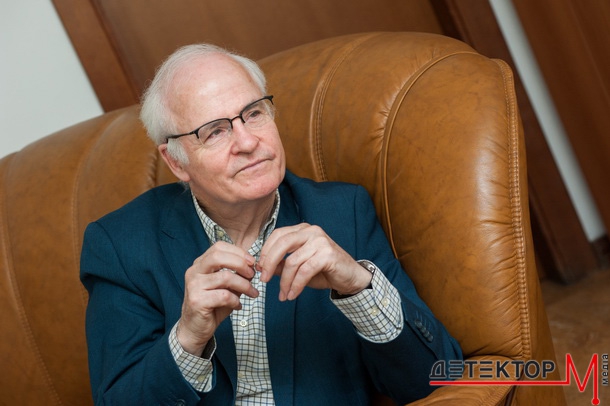
On the one hand, yes. But I think that media education is aimed primarily at children, because their attitudes and behavior can still be changed. But how to convince an adult not to post something because it is irresponsible? I think it is extremely difficult. Maybe you have some specific effective recipe, how can media literacy be increased in adults? :)
Well… I mean I have a number of presentations that I made to journalists about information, communications, and how we should do it. And I always had a thought: I need in a room politicians, I need in this room state bureaucrats, I need in this room policemen and policewomen, I need in this room teachers, I need people beyond journalism to understand what the hell is going on in the world around you. People don’t talk about these issues. And the media literacy work that’s done is entirely focused, unfortunately, on investment as educational structure largely for young people. We need to have media literacy and educational literacy among the whole other end of the population. That’s the work that the ethics commission should be involved in with civil society, seems to me. In order to tell the people what the ethics commission is doing the ethics commission needs to educate people to help understand the modern world of media and communications and information.
I have read such an opinion of the American media critic Jennifer Posner, that “We don’t have media literacy in this country in any kind of substantive way. If we did, I think that (A) more of us would’ve recognized the threat that Trump posed from the beginning, and (B) no one would have been surprised at the bigotry that was in the DNA of his campaign.” Do you agree with this opinion?
I don’t agree with that at all. The problem is that you have to make a distinction between what are media questions and what are political questions. One has to be very-very careful about this. If there had been media literacy, the election would not have taken place. If there had been media literacy, you wouldn’t have the media system that you’ve got. If there had been media literacy, we wouldn’t have this uncontrolled growth of abusive communications and so on. If there had been media literacy, we wouldn’t have women in media subjected to targeted abuse which is sexualized and completely unacceptable. It’s a cliché. It deconstructs or attempts to contextualize a very complicated issue into a sound-bite.
Media literacy is a part of a program of change that is required in the whole information landscape. Because media literacy is directed towards the audience and parent the audience. But the audience is the part of a problem because what has happened is the audience has been through a new economic model for information. The audience has allowed its identity, its private life to be taken over by corporations. So when we have signed up for free services on the internet – Instagram, Twitter, FB or whatever – we say to these companies “here’s my identity, here’s my private information, these are my friends, my political views, this is what I buy, this is where I go on holiday, this is the food I like, this is the places I like to go, these are the football teams I support, this is the clothe I like to wear”, so we give them all of our information and we say “use it, exploit it because you’re giving me something that is free. So I can use my Gmail, Instagram, my Twitter account and so on. I can communicate. Fantastic! So take my life and exploit it.”
So who’s to blame? We have to recognize that we have created a monstrous culture of communications in which we have surrendered our identity, private lives. And we have created bubbles in which we live, where we have our friends, prejudices to help us never listen to voices we don’t like. So we don’t listen to people we disagree with.. And when these other opinions come in because we don’t like them we say they’re lies. So this means that we’re on the verge of death of pluralism. Pluralism is when you listen to other different opinions and they circulate and so on. So how does the democracy survive if there is no pluralism? Because if you do not have competing opinions, competing ideas, competing ideologies, how do people make any decisions? Whom to vote for? Where to live? Where to send their children to school? What jobs to do? How do we make these decisions if we’re not listening to other points of view?

I’m deeply frustrated that there is no political movement that properly recognizes this because there is political self-interest of work. Because the political movement would say that the democracy is the political movement that says that we must listen to the other people, we must listen to the other side of the story, we must open our minds to different thoughts, different ideas. But we’re in the process of closing up. So this is what we need to talk about. And this is why journalism struggles. Because journalism is built on pluralism.
“I’m ready to work with Google and FB.
But I am not making excuses for them”
In your words, it turns out that we are close to the death of pluralism to large extent because of the Internet and large technology companies. But is it right to blame only them? In the end, there always were fake news and threats to pluralism. Probably not only Facebook and Google are responsible?
I disagree. I think they have to be held responsible. These are not small companies or small players. Google has a market value 600 billion dollars. It’s worth more than many middle-sized countries. Facebook has a market value 400 billion dollars. This isn’t a small company. And they have no sense of social responsibility. But they are forced to make changes. Because politicians threaten them with laws as in Germany and in Britain. Or because advertisers refuse to accept that their companies are going to be put on the same pages with hate-speech web-site or a terrorist web-site and so on. And I think they are always just forced to make changes. And they always say the same corporate mantra. They say “We care. Our mission is to eliminate all of the hatred and pornography and so on. We want the information space to be free and at the same time everybody to communicate.” But every day that passes they prove that that’s bullshit. Because actually what happens is they do not listen to people.
The latest figures show that they have only taken down 50% of complaints that had been made from political and commercial sources. And virtually nothing has been taken down where complaints had been made by ordinary subscribers. So the point is that if you’re just a subscriber and you don’t like something you make a complaint, it gets ignored. But if you’re an advertiser and you have power, it gets taken seriously. Or if you’re a politician or a government and you have power, you get to be taken seriously. But only for 50%.

FB have said, we’re going to increase the number of people who are working to monitor the information from 3 000 to 7 500 worldwide. Think about that. 7 500. What that means is they’re going to appoint one person to monitor the communications of a quarter of a million subscribers to FB. That is just not serious. I say to them, how many journalists have lost their jobs in the last twenty years as a result of the economic changes taking place by FB and Google and so on? Across North America – about 50 000. Across Europe about a hundred thousand. They might be trying to solve the problem if they were prepared to employ 50 000 journalists from various parts of the world. Then there might be a contribution to try to solve the problem. They won’t do that. Why won’t they do that? Because it actually costs money. And it interferes with their economic model.
It take the view, of course, there has always been the fake news. The difference this time… There has always been the fake news for purpose. Politicians made up stories. Wars had been started on the basis of fake news. The difference that is now is that with fake news it’s not about cheating about a political objective or attacking one community or another. It’s about making money. Fake news is a way of generating income. It’s a way that you make money in a new model.For example, when they had the story in Macedonia of young people making up stories. It shows young people who are ingenious. They are creative, they are innovative, they are talented, they see an opportunity and they do it. Or why not?
I don’t blame these youngsters of that. I blame the economics of the new information system for making it easy for that.
So, no, I’m ready to work with Google and FB and talk about all sort of things like that. We should always do that to solve the problem. But I am not making excuses for them.
Under what conditions may Facebook lose its popularity in the world which it has now?
I think one of the thing that can happen is if we invest properly in providing people with services for good communications. Without them having to surrender their identity and their private lives. If we can diminish the capacity of these companies to exploit private information by creating more publicly available systems and structures for communications, then… If we can introduce a public interest sector into the information field which challenges the authority and the power of these big companies, then we can give people the viable alternative. But at the moment people have no alternative.But governments are not prepared to do this. And setting up new institutions is really difficult task. And the nature of capitalism doesn’t allow that to happen. I think the critical point will be when the declining confidence in the democracy reaches the stage where the social structures of the society begin to fall down. Where we begin to see more social conflict. People are becoming more frustrated, they are becoming more fearful. There’s more fear in the world than has been. And there’s more hatred. Unfortunately, unless we have governments being prepared to apply more strong measures to pull these companies into line then we have problems
Just to be clear, I’m not in favour of using the law to try to control the information sphere. I believe in a voluntary principle. People should be encouraged to do the right thing. I would like FB and Google and others to invest more of their profits in building structures for good communications, quality. I would like them to introduce rules which say “this is journalism, recognized journalism, something that you should support.” I would like them to identify, for instance, pornography sites and say “this material we don’t particularly agree with but some people want it. But we would advise you to remember that this is potentially socially harmful.”
I would like them to be more rapid, more active in investing in people to take down abusive hate-speech, terrorism, propaganda, that sort of thing. And I would like them to do that voluntarily without being told to or being forced to by the law. But I’m not surprised that in Germany the government is thinking of forcing these issues. And in Britain thinking of the same thing. Unless these countries begin to apply voluntary principle and make reforms, then we are going to see the use of law.
Regarding the application of the law to the case of social networks… You probably know that recently the President of Ukraine put into execution the decision of the National Security and Defense Council on the blocking of part of Russian resources, in particular, social networks Vkontakte and Odnoklassniki. This decision was seen as controversial – part of the society agreed that these resources spread propaganda, while the rest was worried that it was an attempt to censor the Internet.
So, my view about this is that I would understand laws like this providing they are fairly applied purely. So if there is attempt to take down Russian language, social communications which are hateful, which are generating hatred and incitement to violence, I’m not against that. But only fine if the same is being done in the Ukrainian language sector. If in the Ukrainian language sector and you might tell me that there isn’t such a thing, I’d be surprised. If they apply it in all language sectors, English, Ukrainian and Russian, we will take down and force down the hate-speech, propaganda, incitement to violence, we will identify pornography, pedophilia, abusive behavior, we will identify it and we will force it to be taken down. Then, ok. That’s a socially responsible approach by them. Without interfering with people’s free expression rights, that’s ok. If it’s targeted only at Russian media and Russian information services coming across borders then it’s unacceptable. Then this is merely a demonstration of self-interested political bias, and it’s not demonstrating a public interest concern for the community.
“Journalists need to support each other.
Otherwise profession will not be able to survive”.
You talked a lot about how the Internet and social networks changed journalism and that there is an information crisis right now. In your opinion, which business model for the media can now be the most appropriate?
I think what media have to do is to try to build different strands or platforms that they use. Try to develop their own web-sites and their own platforms. Try to work with FB and others to try to minimize the impact of the internal censorship that goes on within these structures.
No, I don’t have a specific answer to this question. I wish I did. I’d be a rich person, and I’d be elsewhere. But actually in that sense that’s not my business. I think there are technical solutions to a lot of the problems that we’ve been talking about. But those technical solutions are not profitable. They are all about limiting the capacity of people to exploit, to make money out of information. And that’s not attractive to big companies. So I find that is extremely difficult. So I’m really interested in one sort of simple message, which is despite everything people do want access to information they can trust. And what media should really work on is building trusted brands.
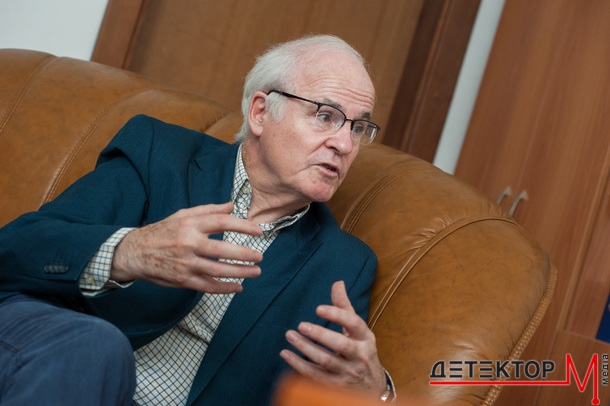
I used to work for the Guardian in London. And today the Guardian as a newspaper has a tiny circulation. A circulation about a hundred thousand every day. But the Guardian as a brand online is one of the biggest, most read brands in the English-speaking world. It has 25 million sort of regular users. So its print circulation has virtually disappeared. But its brand circulation – of trusted journalism – has just grown and grows.
And one of the interesting things about going back to the US and Trump and so on is that the election of Trump, the confrontation he’s made with media has increased the capacity of those media to work. So the subscriptions to the New York Times, the Washington Post, CNN and others have absolutely gone through the roof. So people have indicated they want to have access to trusted information, trusted brands.
I remember during the Nice terrorism attacks. When all of those people were killed in Nice. On the social networks they began streaming pictures of people who have been killed and the violence, and it was awful. But the media didn’t do that. They didn’t stream the information that was being run on the Youtube and FB, this information was being circulated everywhere. But media refused to do that. They looked at the pictures, they looked at the videos, they said we can use this, we can’t use that, that’s too painful, that’s too explicit. So they were journalistic about it. They chose the images to show. And what was interesting all of those media had enormous spikes, increases in the audience. The audience went to the media to get the information. Even though it was online. And why was that? Because media provide trusted, quality information which people recognize. So whenever there is a big story, a big crisis emerges, where do people go for the information if they go online? But they don’t go to online portals and so on. Even here, in Ukraine, the trusted brands will have the highest circulation.
But are people willing to pay for such information?
Problem with the new market model is it’s something for free. That information is free. So if you go online, we have the whole generation of young people who believe: “If it’s online I can download it for free. Film, music, information. I don’t have to pay for anything. I shouldn’t have to pay for anything. And also I don’t have to acknowledge where the information comes from». God help the university teachers, school teachers who are trying to earmark children’s essays when they know the plagiary is everywhere. So this mentality of a free for all culture has been created by this new market model. This new market model which says ‘tick the box, give us access to your life, your identity, we will give you this for free’. People say yes, ok. My children are highly educated, they’re very nice young people. It took me a couple of years to convince them that copyright was important. It is beginning to change. The music industry has very slowly begun to recover. But I don’t think it will ever get back to where it was. And journalism is suffering in exactly the same way. You know, the answer to any problem is google it. What do you want to know? What would people always say when they ask a question? Google it. You’ll find it. Actually, that’s true.
Can you briefly list the main features that are essential for a journalist today?
But above all, journalists should make themselves accountable. They should say ‘If I’ve made mistakes, tell me. I’ll just be ready to engage with it.” And they need to be respectful of others in the way that we work is essential. I think, if someone does the journalism today without showing hate-speech, without being biased, overly biased, they will do a good job.
But the most important thing of any journalist can do is to support other journalists. And this is the one thing where I find it most frustrating. Everywhere I go, there is a lack of solidarity within journalism. They need to engage with one another. And they need to support the profession as well. Until we don’t do that, journalism will not be able to survive.
Photo by Pavlo Dovgan




